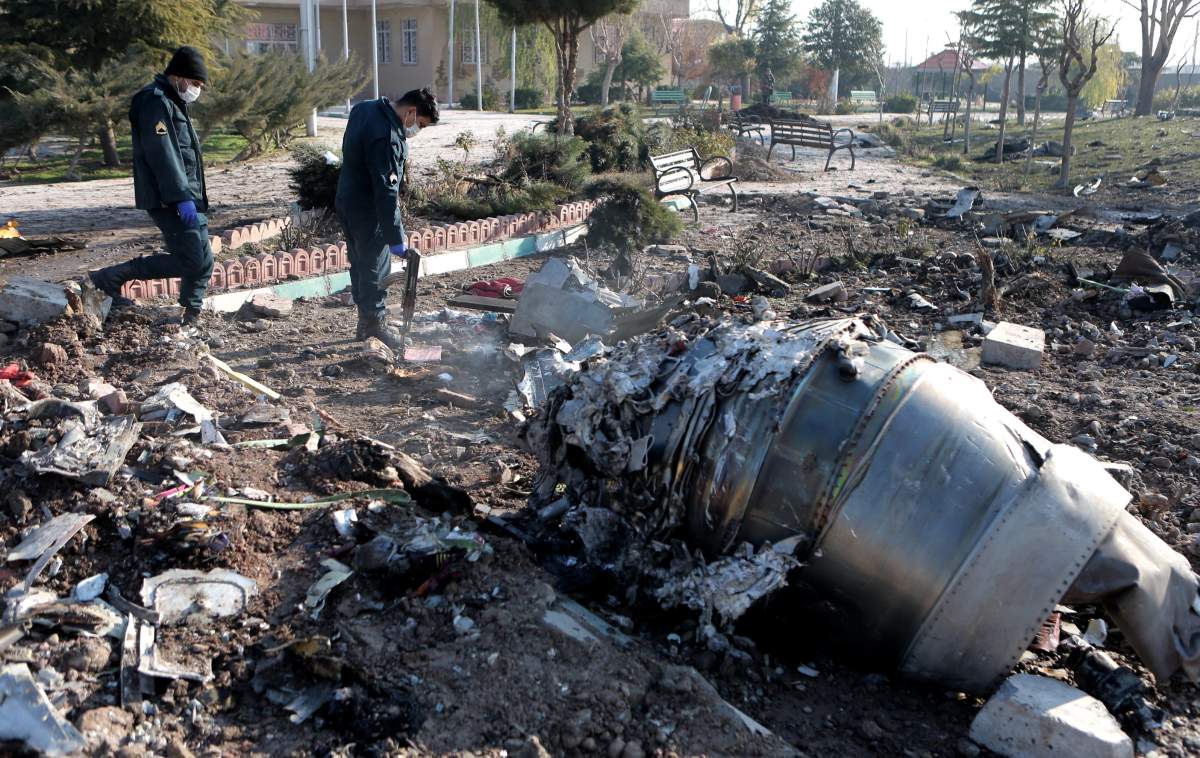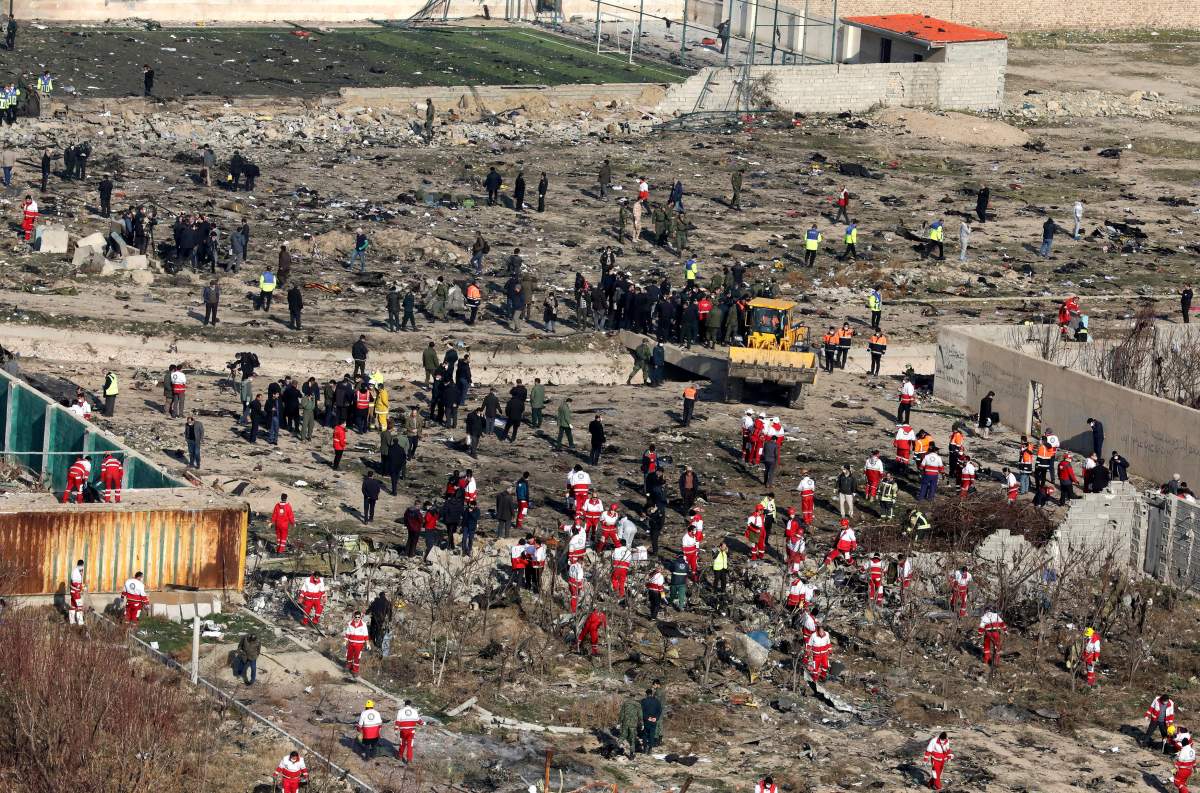EDITOR’S NOTE: On Jan. 10, the Canadian government updated the number of Canadians killed in the Jan. 8 Ukraine International Airlines crash in Iran from 63 to 57.

An Iranian missile appears to have brought down a Ukrainian passenger plane over Iran this week killing 176 people – including 63 Canadians – Prime Minister Justin Trudeau said Thursday.
“We have intelligence from multiple sources, including our allies and our own intelligence. The evidence indicates the plane was shot down by an Iranian surface-to-air missile,” Trudeau said during a news conference in Ottawa.
“This may well have been unintentional.”
Trudeau wouldn’t reveal what the intelligence was, exactly, but his comments followed earlier statements from anonymous U.S. officials Thursday who said with a “high level of confidence” that the Iranians shot down the airliner accidentally, according to multiple reports.
A look at Iran’s surface-to-air missile system
Iran has the Russian-made Tor missile system, commonly known as the SA-15 “Gauntlet,” according to the Military Balance — an annual publication by the International Institute for Strategic Studies (IISS).
The SA-15 is designed to operate at a medium to very low altitude and destroy aircraft, cruise missiles, precision-guided munitions and unmanned aerial vehicles, according to the IISS. The weapons system has a maximum range of 25 kilometres and can intercept aircraft at an altitude of up to 32,800 feet.

U.S. intelligence sources have told the Associated Press and New York Times that two surface-to-air missile launches were detected from an Iranian missile battery minutes after the plane took off, followed by an explosion near the plane.

Get breaking National news
Video – which has not been independently verified by Global News – reportedly shows the moment an Iranian missile struck Ukrainian Airlines Flight PS752.

Iran has strongly denied the allegation.
“Scientifically, it is impossible that a missile hit the Ukrainian plane, and such rumours are illogical,” Ali Abedzadeh, the head of Iran’s Civil Aviation Organization, was quoted as saying by the semi-official ISNA News Agency on Thursday.
How it may have happened
The aircraft was destroyed roughly four hours after Iran launched more than a dozen ballistic missiles targeting Western forces in Iraq, in response to the U.S. targeted killing of Iranian military commander Qasem Soleimani.
Experts say it’s amid this heightened state of alert that the shootdown could have occurred.
Dave Perry, a military analyst at the Canadian Global Affairs Institute, said the SA-15 could have been deployed by the Iranian military to defend the airport if officials feared a U.S. counter-attack.
Perry said once these weapons systems were armed, they were likely at a “high state of readiness.”
“There’s likely a sensor, or radar, on the ground that sends out a signal and gets a return of whatever it bounces off of,” he said. “Based on the characteristics of how it reflects, a computer then says, ‘If it looks like X, then it’s a plane of this type.’”
“Those systems aren’t 100 per cent.”
Perry said the weapons systems can also malfunction due to human error, resulting in tragedy.
Retired Canadian major-general David Fraser told Global News the weapons system is fairly sophisticated, but it would have been likely manned as it was next to an airport with regular service.
“You have everyone on edge, and it wouldn’t take very much to inadvertently fire at something.”

Fraser also laid blame at the feet of Iranian air authorities.
“Why was a plane flying that night? It just baffles my brains.
“The civil air authorities should have shut down the airspace.”
Perry compared the Ukraine plane crash to the downing of Iran Air Flight 655 in 1988, when the U.S. military shot a passenger jet originating from Tehran.
The plane was flying over the Strait of Hormuz toward Dubai when it was hit by two surface-to-air missiles.
Pentagon officials denied the incident, but it was later revealed the plane had been targeted by the USS Vincennes, a guided-missile cruiser that had mistaken the passenger jet for an Iranian warplane.
Trudeau said Thursday the new information “reinforces the need for a thorough investigation into this matter.” The majority of people on the flight – 138 – were heading to Canada, and at least 63 were Canadian citizens.
Canadian Foreign Affairs Minister Françcois-Philippe Champagne spoke with Iranian Foreign Minister Mohammad Javad Zarif and demanded access to Iran.
“Minister Champagne made it clear Canadian officials must immediately be granted access to Iran to provide consular services, identify the victims and participate in a thorough investigation,” the prime minister said.
“It’s more important than ever that we know exactly how such a tragedy could have happened. The families of the victims, and all Canadians, want answers. I want answers. That means closure, transparency, accountability and justice. This government will not rest until we get that.”
–With files from the Associated Press

















Comments